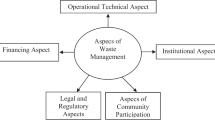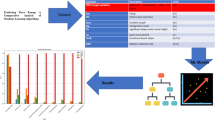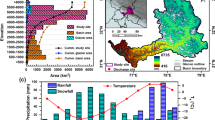Abstract
The feasibility of modeling municipal waste generation (MWG) for countries at different levels of development using artificial neural networks (ANN) and selected generic indicators of sustainability was investigated. The main goals of this research were to develop ANN-based models for predicting MWG, to overcome the problem of incomplete MWG data, which is notable in developing countries, and to provide a new method for the planning of municipal solid waste management systems as well as for the simulation of various other scenarios. Data from 26 European countries was used in this study as training, test and validation datasets for the developing of ANN models. Since this kind of modeling is particularly important for developing countries where MWG data is missing or incomplete, emphasis was placed on modeling of MWG for Bulgaria and Serbia. Based on a comparison of actual MWG data with predictions given by the model, we show that ANNs can be applied successfully to modeling and forecasting MWG on a national scale. Moreover, the scope for possible application of the model is broad, since it uses generic indicators of sustainability such as gross domestic product, domestic material consumption and resource productivity, and performs well for countries with highly diversified levels of economic development, industrial structure, productivity and output.







Similar content being viewed by others
References
Bayar S, Demir I, Engin GO (2009) Modeling leaching behavior of solidified wastes using back-propagation neural networks. Ecotoxicol Environ Saf 72:843–850
Beigl P, Lebersorger S, Salhofer S (2008) Modelling municipal solid waste generation: a review. Waste Manage 28:200–214
Berkun M, Aras E, Nemlioglu S (2005) Disposal of solid waste in Istanbul and along the Black sea coast of Turkey. Waste Manage 25:847–855
Chung SS, Lo CWH (2008) Local waste management constraints and waste administrators in China. Waste Manage 28:272–281
Dedijer A et al (2007) ENVIRONMENT in Serbia: an indicator-based review. Serbian Environmental Protection Agency, Belgrade
European Environment Agency (2010) The European environment—state and outlook 2010. http://www.eea.europa.eu
Eurostat (2010a) Domestic material consumption. http://epp.eurostat.ec.europa.eu/tgm/table.do?tab=table&init=1&plugin=1&language=en&pcode=tsdpc230
Eurostat (2010b) Gross domestic product at market prices. http://epp.eurostat.ec.europa.eu/tgm/table.do?tab=table&init=1&language=en&pcode=tec00001&plugin=0
Eurostat (2010c) Resource productivity. http://epp.eurostat.ec.europa.eu/tgm/table.do?tab=table&init=1&plugin=1&language=en&pcode=tsdpc100
Eurostat (2010d) Municipal waste generated. http://epp.eurostat.ec.europa.eu/tgm/table.do?tab=table&init=1&plugin=1&language=en&pcode=tsdpc210
Gamze Turan N, Çoruh S, Akdemir A, Nuri Ergun O et al (2009) Municipal solid waste management strategies in Turkey. Waste Manage 29:465–469
Henry RK, Yongsheng Z, Jun D (2006) Municipal solid waste management challenges in developing countries—Kenyan case study. Waste Manage 26:92–100
Hristovski K, Olson L, Hild N, Peterson D, Burge S (2007) The municipal solid waste system and solid waste characterization at the municipality of Veles, Macedonia. Waste Manage 27:1680–1689
Jahandideh S, Jahandideh S, Asadabadi EB, Askarian M, Movahedi MM, Hosseini S, Jahandideh M (2009) The use of artificial neural networks and multiple linear regression to predict rate of medical waste generation. Waste Manage 29:2874–2879
Kalogirou AS (2003) Artificial intelligence for the modeling and control of combustion processes: a review. Prog Energy Combust Sci 29:515–566
Mor S, Ravindra K, Visscher A, Dahiya RP, Chandra A (2006) Municipal solid waste characterization and its assessment for potential methane generation: a case study. Sci Total Environ 371:1–10
Ngoc UN, Schnitzer H (2009) Sustainable solutions for solid waste management in Southeast Asian countries. Waste Manage 29:1982–1995
Noori R, Abdoli MA, Farokhnia A, Abbasi M (2009) Results uncertainty of solid waste generation forecasting by hybrid of wavelet transform-ANFIS and wavelet transform-neural network. Expert Syst Appl 36:9991–9999
Noori R, Karbassi A, Sabahi MS (2010) Evaluation of PCA and Gamma test techniques on ANN operation for weekly solid waste prediction. J Environ Manage 91:767–771
Phillips J (2010) The advancement of a mathematical model of sustainable development. Sustain Sci 5:127–142
Pocajt V (1999) Development of atmospheric dispersion model based on neural networks (in Serbian). PhD Thesis, Faculty of Technology and Metallurgy, Belgrade, Serbia
Radojević DM, Pocajt VV, Popović IG, Perić-Grujić AA, Ristić MDJ (2010) Forecasting of greenhouse gas emissions in Serbia using artificial neural networks. Energy Source Part A. doi:10.1080/15567036.2010.514597
Schubeler P (1996) Conceptual framework for municipal solid waste management in low-income countries. Urban management programme working paper no. 9, World Bank
Serbian Environmental Protection Agency (SEPA) (2009) Report on the environmental situation in the Republic of Serbia in year 2008 (in Serbian). Ministry of Environment and Spatial Planning, Belgrade
Serbian Environmental Protection Agency (SEPA) (2010) Report on the environmental situation in the Republic of Serbia in year 2009 (in Serbian). Ministry of Environment and Spatial Planning, Belgrade
Shekdar AV (2009) Sustainable solid waste management: an integrated approach for Asian countries. Waste Manage 29:1438–1448
Sözen A, Arcaklioğlu E (2007) Prediction of net energy consumption based on economic indicators (GNP and GDP) in Turkey. Energ Policy 35:4981–4992
Sözen A, Gülseven Z, Arcaklioğlu E (2009) Estimation of GHG emissions in Turkey using energy and economic indicators. Energ Source Part A 31:1141–1159
Statistical Office of the Republic of Serbia (2008) Statistical yearbook of Serbia 2008. http://webrzs.stat.gov.rs/axd/en/index.php
Statistical Office of the Republic of Serbia (2009) Statistical yearbook of Serbia 2009. http://webrzs.stat.gov.rs/axd/en/index.php
Statistical Office of the Republic of Serbia (2010) Statistical yearbook of Serbia 2010. http://webrzs.stat.gov.rs/axd/en/index.php
Vego G, Kučar-Dragičević S, Koprivanac N (2008) Application of multi-criteria decision making on strategic municipal solid waste management in Dalmatia, Croatia. Waste Manage 28:2192–2201
Ward Systems Group (2010) NeuroShell 2. http://www.wardsystems.com/neuroshell2,asp
Weisz H, Krausmann F, Amann C, Eisenmenger N, Erb KH, Hubacek K, Fischer-Kowalski M (2006) The physical economy of the European Union: cross-country comparison and determinants of material consumption. Ecol Econ 58:676–698
Yin R, Xiang Q (2010) An integrative approach to modeling land-use changes: multiple facets of agriculture in the Upper Yangtze basin. Sustain Sci 5:9–18
Acknowledgments
The authors are grateful to the Ministry of Science and Technological Development of the Republic of Serbia, Project Nos. 172007 and 13002 for financial support.
Author information
Authors and Affiliations
Corresponding author
Additional information
Handled by Masaru Yarime, The University of Tokyo, Japan.
Rights and permissions
About this article
Cite this article
Antanasijević, D., Pocajt, V., Popović, I. et al. The forecasting of municipal waste generation using artificial neural networks and sustainability indicators. Sustain Sci 8, 37–46 (2013). https://doi.org/10.1007/s11625-012-0161-9
Received:
Accepted:
Published:
Issue Date:
DOI: https://doi.org/10.1007/s11625-012-0161-9




